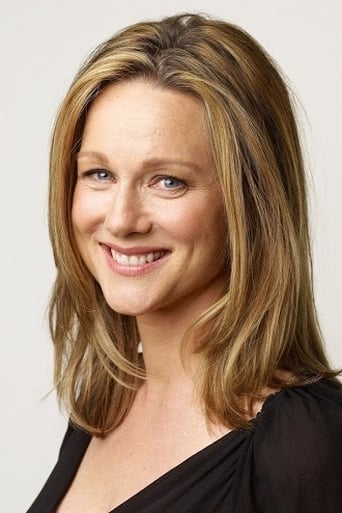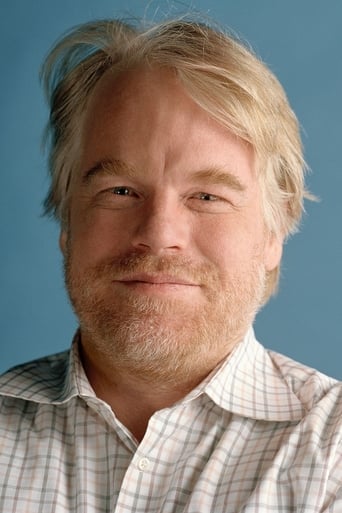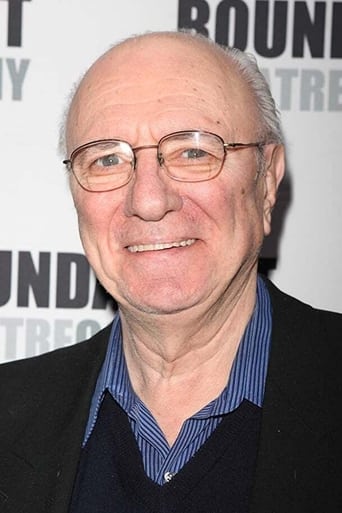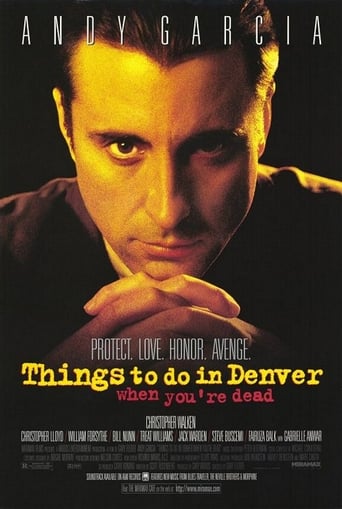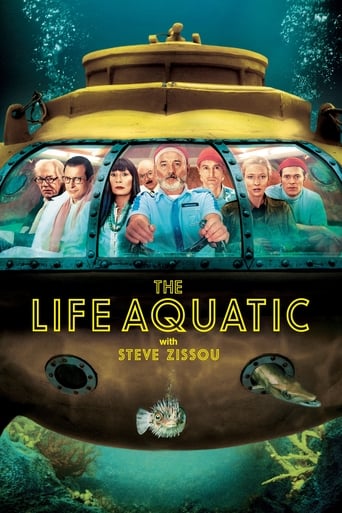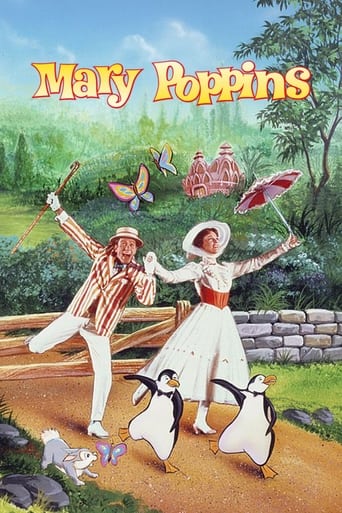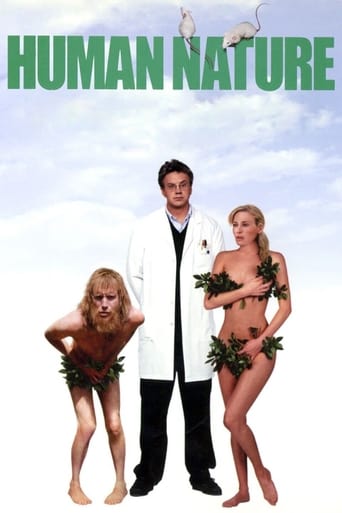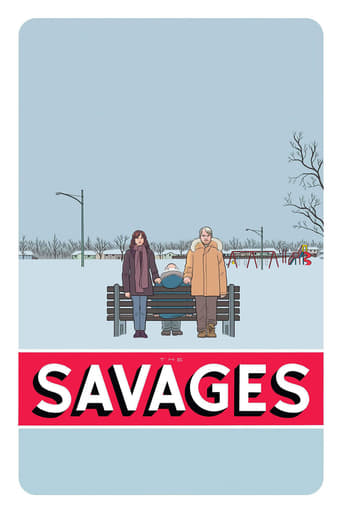
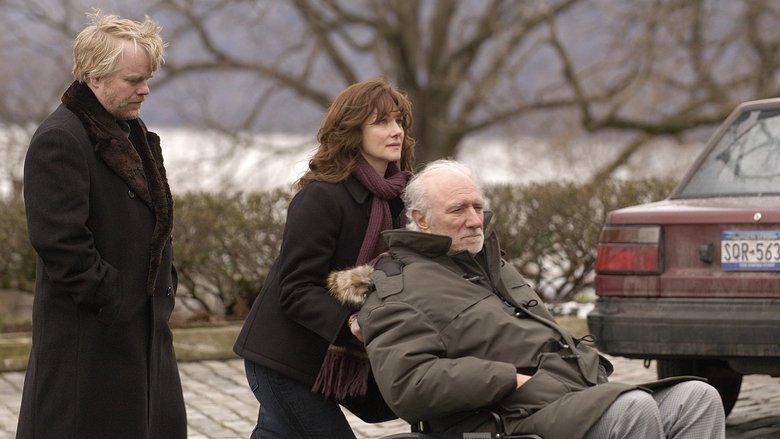
The Savages (2007)
A sister and brother face the realities of familial responsibility as they begin to care for their ailing father.
Watch Trailer
Cast


Similar titles
Reviews
I don't think it has dawned on the cinephile community, or even the public, how much of a loss Philip Seymour Hoffman really was to the film industry and the world. Hoffman was an actor who could show us what it was like to be deeply-rooted in reality, giving us the most tender and affectionate performances of characters all across the board, truly defining what it means to be a great character actor. I've always loved the philosophy of acting Hoffman stood by, which is to make your lead character look a bit messy at times; maybe his hair wasn't properly combed, his shirt wasn't thoroughly ironed, or maybe he had an itch or was even sweating at times. All these little nuances likely to go unnoticed by most people, Hoffman emphasized and, in turn, would create a deeper character out of those. Hoffman's philosophy was put to great use for Tamara Jenkins' The Savages, an upsetting but extremely well done film I instantaneously thought would've been put into the hands of known dramatist and director Alexander Payne. It wasn't until the closing credits revealed to me that Payne was the sole credited producer of The Savages. In addition, further research led me to find that Jenkins is married to Jim Taylor, the longtime business partner of Payne, who was no doubt contacted by Taylor in order to get financial backing for his wife's project. Cinema has vast ways of coming full circle.The film centers around two grown-siblings Jon and Wendy Savage (Philip Seymour Hoffman and Laura Linney), who are brought together after they receive a call that their father Lenny (Philip Bosco), a man quickly falling prey to dementia, has been writing obscenities on the wall of his home in his own feces. Lenny still has the luxury of living at home, but after this uncomfortable and peculiar episode, both Jon and Wendy must now try to face two demons - coming to terms that their dad may be approaching his final days and needs to be put in an assisting living community, as well as trying to look past the fact that their father neglected them quite a bit as kids, which may justify both souls being emotionally broken in the present. The Savages deals with these difficult things in life with the tender focus the subject deserve. The characters are never put in a place where they simply exist for comic relief or to poke fun at the issues at hand; Jenkins gives these characters a lot on their plates and, in turn, rewards them with human sensibilities and believable reasoning to eventually arrive at a decision. First and foremost, it must be said that Hoffman and Linney have a unbelievable chemistry together, so much so that believing the two are siblings wouldn't be such a stretch. The way they talk on the phone, the way they interact in public, and the way they go about dealing with issues that arise from dealing with their father's bouts with old age all feel authentic, with conversations existing not to extend the length of the film or just to provide insignificant banter, but to try and grapple with the problem in a realistic manner. They have that kind of chemistry and conversational naturalism you find in two people that have been friends for decades and, even when they haven't spoken in months, maybe even years, when they are reunited, they still possess that same sort of captivating spirit in their exchanges.It may seem that I'm emphasizing the fact that this film is more drama than comedy way more than I should be, but consider the first scene of the film, where we see Lenny write obscenities on the wall in his own feces. Imagine if Jenkins decided to take a more comedic approach, with one of the siblings laughing, making jokes about it, or what-have-you. The film would've likely been irredeemably mean-spirited and crass to the point of being impossible to take seriously. Instead, Jenkins knows this material is not funny and needs to be handled with a delicate, intimate touch, one more focused on honest conversations nobody really wants to have instead of dialogs designed solely to evoke a few chuckles.Take a look at the film's best scene, where Jon, in a brutally honest tone, screams at Wendy for being way too oppressive when it comes to picking the right nursing home, ejecting their father from one place to visit another, completely eliminating all ability for him to get comfortable and adjust. Jon reveals the truth about nursing homes that I have held onto ever since I was young, visiting my grandmother in one who was confined to a wheelchair. He explains how the freshly-cut grass, the beautifully-planted flowers, and the antiseptic appearance of the building's exterior gives the look to passersby and only temporary visitors that this is a beautiful, happy place. However, these carefully-calculated little decorations only obscure the fact that people die in these buildings and that the death occurring in the particular building is a miserable, excruciatingly painful, merciless bout of torment that bears the unpleasant look of a morgue and smells of nothing but Ensure and rotten stink.The Savages is not a happy movie experience, and for that I see it being written off by far too many people who do not crave an upsetting experience. The only thing I know is that sheltering off a film like this - especially seeing as it is very good and deeply rooted in honesty and realism - shows that one is fearful of what the future may bring in the regard of age, senility, and inevitably, death. I'm a teenager and I found ways to connect to this film and embrace its message and its events. Come on, now, you can too.
Directed by Tamara Jenkins, "The Savages" is an intermittently interested drama starring Philip Seymour Hoffman and Laura Linney. They play a middle aged brother and sister who struggle to take care of their elderly father, played by Philip Bosco."The Savages" is at its best when its observing as these two siblings, both dysfunctional writers, move in with each another and tentatively expose their feelings in subtle, guarded and tangential ways. Filled with self-loathing and deep insecurities, these two characters are expert at skirting around issues and putting on false facades.Unfortunately, such moments are few and far between. Though the film is riveting whenever it centres on its sibling relationship, it eventually degenerates into a sentimental melodrama, in which the duo's father slowly slips into dementia.Incidentally, the film's title offers multiple readings. It refers to the literal surname of Hoffman and Linney's characters, their fear of "becoming savages who neglect their father", and also the "savagery" of their father himself, who was an abusive, mean dad for most of their childhood lives. The film suggests that the duo's present dysfunctions are a result of their dad, but also that he's become a scapegoat who absorbs all blame.8/10 – Worth one viewing.
What a disappointment this movie is. Nothing about it is believable. None of the angst the characters are supposed to be experiencing rings true at all, nor does their sudden concern for their father's welfare after a lifetime of abuse and estrangement. The only thing that is at all believable is the bickering between the two siblings, and that does not make for a meaningful or entertaining movie-watching experience.I come from a dysfunctional family myself, also with dying or recently dead parents, and I resent the cavalier way Tamara Jenkins turns the situation into a cheesy soap opera with a happy ending. There can be no happy endings in families like that. The Savages is cheap (and I don't mean low-budget), pretentious, and annoying.
Philip Seymour Hoffman and Laura Linney give us a pair of performances right out of their standard playbooks...and the remarkable thing is that they both work so well. Hoffman's slobby demeanor, unshaven face, red eyes and a delivery so bored you can tell it just feels like his character can barely stand the idea of talking are nothing new...but they are still effective. Linney gives another over-energized, on-the-edge but super intelligent performance...again, nothing new...but still very welcome.These two play siblings of the Savage family, who, while not exactly estranged, probably aren't spending much time with each other either. Hoffman is a Brecht scholar and professor in Buffalo, and Linney works as a temp in NYC, while waiting for a grant that will allow her to pursue her dreams of playwrighting. They are brought together when they have to bring their father (Philip Bosco) back to New York after his long-time girlfriend dies. Dad is suffering from early stages of dementia and has other ailments, so Hoffman persuades Linney that the only place for dad is a nursing home.I fully expected this movie to be an indictment against our treatment of the elderly, or one of those family dramas where everyone yells at each other all the time. Instead, the siblings are mostly uncomfortable with each other. Each is in the end-stages of relationships and neither feels comfortable sharing much about their personal lives. They agree to live together for a little while, so they can trade off looking in on dad. The movie mostly explores their brittle relationship with each other. Dad clearly wasn't much in the parenting department, and no doubt his kids owe a lot of their failures and foibles to that fact...but Dad is now mostly a non-entity. He sometimes recognizes them, and sometimes he resists efforts to move him or change his clothes...but mostly he is lost and passive. He's hardly the man they both grew to dislike...he's mostly an obligation. To the credit of the brother and sister, they never argue over who will "take care of dad" or spout clichés like "you're getting off easy." They both understand that this burden has fallen to them, and while not happy about, they will handle it.Hoffman is more practical. He finds Dad a nursing home near his house. It's got a plain exterior and feels like a hospital. They take medicare and can provide for dad. (In fact, I really enjoyed the fact that this home, while still somewhat depressing, actually cared for its patients, treated them with respect and didn't generate any enmity from the audience.) To Hoffman, the place is fine. Linney wants dad somewhere "nicer," preferably a place in Vermont. She is somewhat driven to find her dad a nicer spot...probably out of some misplaced guilt.Not a lot happens in this film. Director and writer Tamara Jenkins is very blessed to have these two great actors, because they make all their interactions crackle with wit, sadness and believability. They love each other...but not in a way that gives them much joy. They are siblings who share little beyond an appreciation for theatre and a dieing father. Yet in many ways, the movie shows them jockeying for the approval of the other. Linney wants to be successful in her brother's eyes, because she thinks he looks down on her. Truth is, he doesn't look down on her all that much...but he's pretty down on himself too and that drags everyone under. Hoffman and Linney are a great cinematic team, and I'd love to see them work together on something again. They whole time I was watching them, I was imagining seeing them in a play together...that would be worth seeing.Philip Bosco is also VERY good as the father. His expression alternates from confusion to anger to disappointment to sadness to emptiness to very mild happiness. He's not an easy guy to like...but he is by no means the clichés dementia victim so many movies dish out. In fact, Jenkins has made all three characters very specific and unique. While it's always a bit heavy-handed to see characters who are writers or "in theatre," even that works for this film, because these two have to live out pretend lives because their real lives hold so little joy. (It's a very nice touch that Hoffman is a Brecht scholar...Brecht was all about the head and not the heart. He didn't want his plays to have real emotion...Hoffman's character is somewhat afraid of real emotion too.) This isn't an earth-shattering film. It has moments of great humor and also some sadness. Mostly, it just feels like a fairly believable slice-of-life. It's not an important film...but it has some great performances, and that makes it very worthwhile.


